Wondering whether you can safely mow your lawn with an electric lawnmower during a wet spell?
We’ve shared everything you need to know in this guide.
✅Key Takeaways:
You shouldn’t cut wet grass with an electric lawnmower because there’s a risk of electric shock.
Mowing wet grass will also affect your lawn health and possibly damage your mower’s electric components.
Check your lawn for water droplets and feel for dampness to check it’s dry enough to mow with an electric lawnmower.
Table of Contents
👷 Is It Safe To Cut Wet Grass With An Electric Lawnmower?
No, it’s not safe to cut wet grass with an electric lawn mower, whether that’s a corded electric mower or a cordless battery-powered mower, due to the risk of electrocution. Mowing wet grass with any lawn mower – electric or otherwise – is also bad for your lawn health.
Water and electricity don’t mix. While most electric lawn mowers are designed with safety features to greatly reduce the risk of electric shock, there’s always a chance that water could get into the mower casing and cause a spark, which sends a shock through the mower and into your hands.
The risk of electrocution is lower with a battery-operated mower, but it’s still there. We personally don’t think that the reward of achieving a neat lawn is worth the risk of putting yourself in danger.
So, don’t mow your lawn when it’s wet – wait for a sunny day!
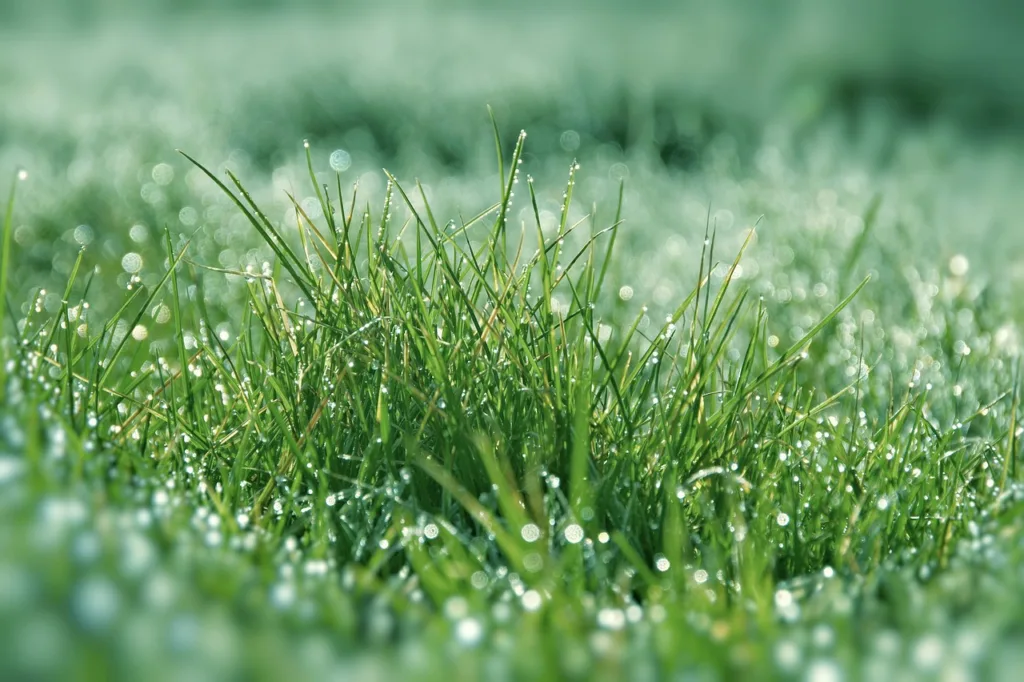
🤷♂️ Can You Cut Damp Grass With An Electric Mower?
No, it’s not safe to cut damp grass with an electric lawn mower. Even if your lawn is only slightly damp rather than wet, you’re still exposing the mower to lawn mower. And that means there’s still a risk of electric shock.
You should always wait for your grass to dry out before you start mowing with an electric mower. That means avoiding mowing dewy grass or grass that’s still slightly damp after a recent rainy period.
🧐 What Happens If You Use An Electric Lawn Mower On Wet Grass?
Using an electric lawnmower on a wet lawn increases your risk of electric shock, causes uneven cutting and clumping, and might damage your mower’s electric components.
⚡️ Increased Risk Of Electric Shock
One of the biggest dangers of using an electric mower on wet grass is the increased risk of electric shock.
Water is an excellent conductor of electricity, and if moisture seeps into the mower’s electrical components or power cord, it can create a hazardous situation for the user.
You don’t need us to tell you that electric shock can cause severe injury or even be fatal. That’s why it’s essential to avoid cutting wet grass to minimize the risk of electric shock.
🏞 Uneven Cutting And Clumping
Mowing wet grass with your electric lawnmower doesn’t just pose a safety hazard – it can also lead to uneven cutting and clumping of the grass clippings, affecting the appearance of your lawn after mowing.
Damp grass blades are likely to stick together in thick clumps, causing the blade under the mower deck to become clogged. As a result, your mower may leave uncut patches on the lawn, giving it an unattractive finish.
Plus, clumped grass can create a thick thatch layer, hindering proper airflow and nutrient absorption in the soil, which will negatively affect your lawn’s health.
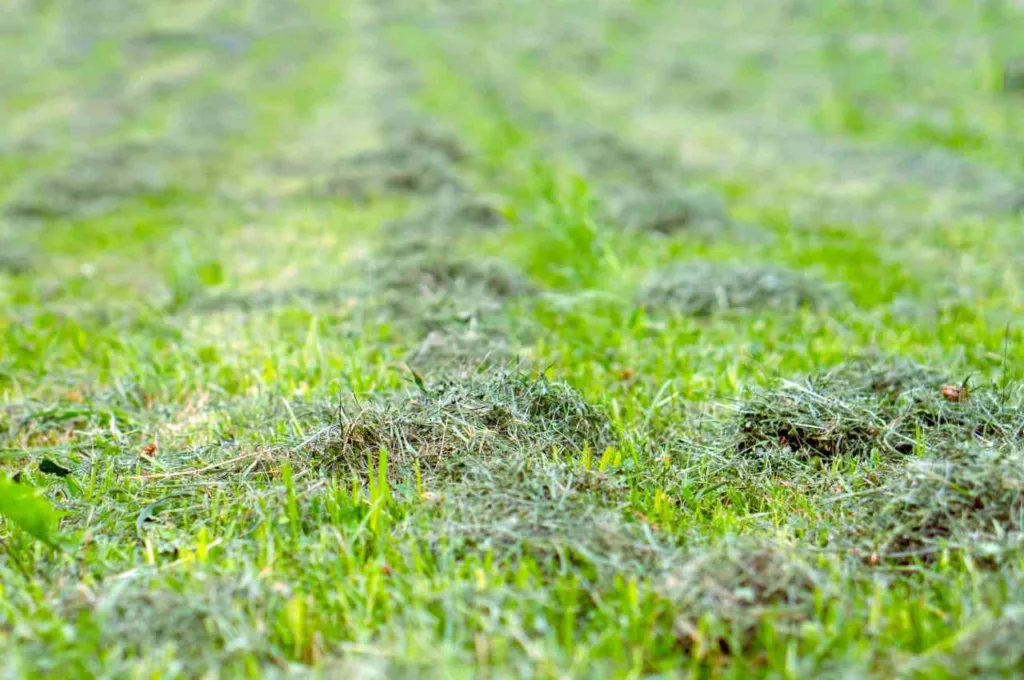
🛠 Potential Damage To Your Mower
Finally, mowing wet grass can result in damage to your lawn mower’s electrical components, motor, and other electronic parts.
The moisture from the grass could corrode the electrical connections, rust the mower blades and other metal parts, and compromise the overall performance and longevity of the mower.
If you want your electric lawnmower to last as long as possible, avoid water in all mowing situations.
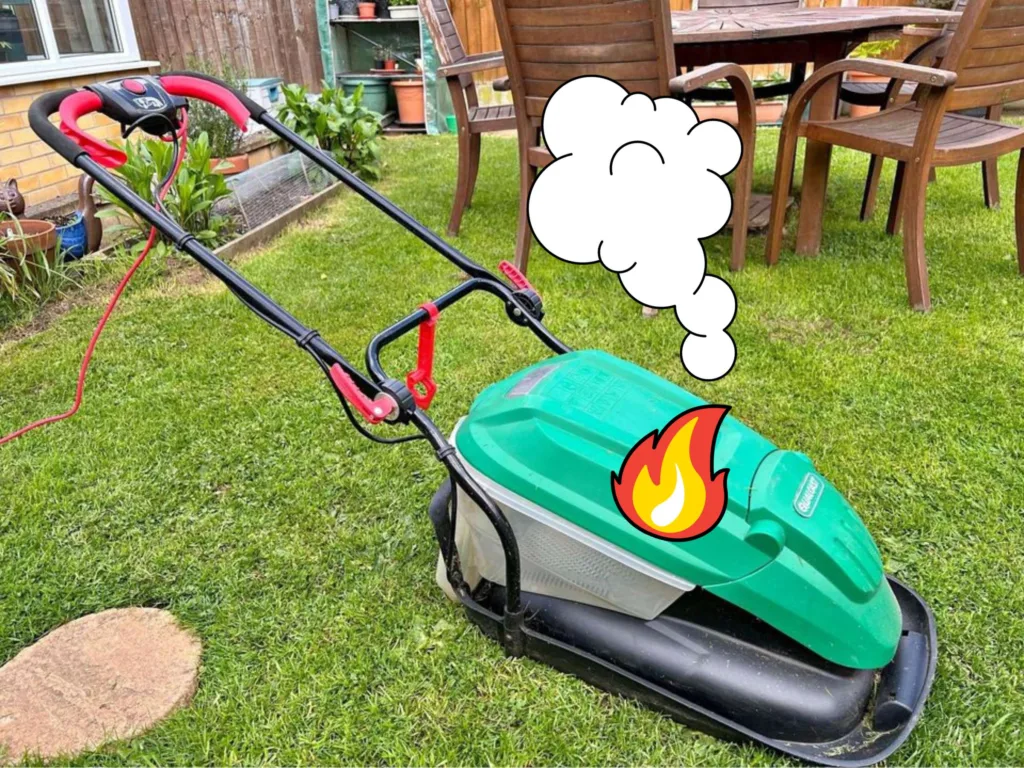
🤔 How To Know When Your Grass Is Dry Enough To Mow
There are a few ways to know when your grass is dry enough to safely mow with an electric lawn mower:
👀 Look For A Lack Of Visible Water
The most obvious way to determine whether your lawn is dry enough to mow is to conduct a visual inspection.
Look for signs of water on your lawn, including droplets on the grass blades, and dark, shiny grass blades. Wet grass is also more likely to bend under the weight of the water, which may slightly alter the appearance of your lawn.
🖐 Feel For Dampness
You can also check whether your grass is dry enough to mow by feeling the lawn for dampness.
Damp and moisture aren’t always obvious from a visual inspection alone. Run your fingers through the grass blades to check their dampness, and avoid mowing if the grass feels cool or moist.
You can also check the soil for moisture. Press your finger on the soil – if it feels dry and your finger doesn’t leave an impression, you should be fine to mow.
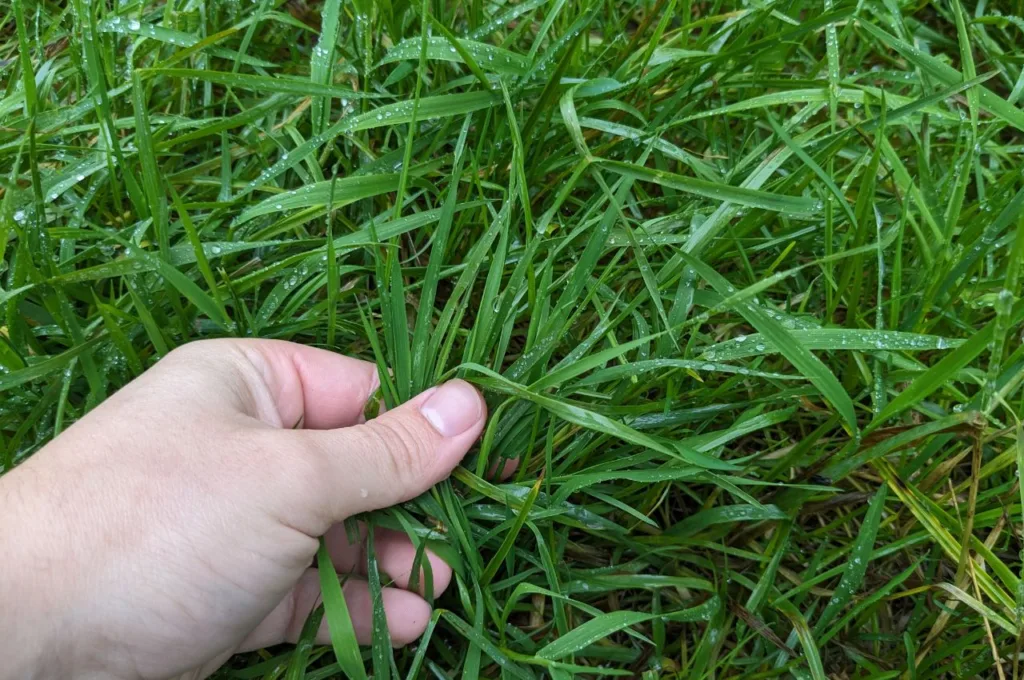
☀️ Wait For A Sunny Day
While visual and physical inspections are the best way to determine the moisture levels on your lawn, you can also use the commonsense method and wait for a sunny day.
If it’s been nonstop raining for the past week or so (i.e. the traditional British summer), there’s a good chance that the ground is too wet to safely use an electric lawn mower on. Wait for the sun to dry your lawn before you think about mowing.
⏰ Mow Later In The Day
We also recommend mowing later in the day, when a dew-wet lawn should have had time to dry out under the sun’s rays (again, assuming that the sun is actually out).
Ideally, mow your lawn at around 5pm, after a day of being warmed by the sun. This should give plenty of time for excess water to evaporate from the soil surface and the grass blades, making conditions safe to mow.
Mowing later in the day doesn’t guarantee that your grass will be dry, especially if you’ve recently had a spell of heavy rain, so make sure to feel your grass for dampness before bringing out your electric mower.

🚿 Can An Electric Mower Get Wet?
No, an electric lawn mower shouldn’t get wet. While well-made electric lawn mowers should have some protection against water, they’re not entirely waterproof. It’s essential to take precautions to prevent your electric mower from getting wet to avoid potential hazards and damage.
That means you shouldn’t mow wet grass or even damp grass with an electric lawn mower, and you shouldn’t continue mowing your lawn if it starts to rain.
You also shouldn’t store your electric corded or cordless mower outdoors between uses, where it’s likely to get rained on at some point. Make sure the mower is stored in a dry location that’s not prone to damp or leaks.
🏁 Final Word
Hopefully, you now understand why cutting wet grass with an electric lawnmower is something we strongly recommend against.
If you’re fed up with having to wait for a completely dry day to mow your lawn (which, admittedly, can take weeks in the UK when we’re having a wet spell), a petrol mower is the best lawn mower to own because it’s safe to operate in wet conditions.
With that said, even the best lawn mowers for wet grass will still damage your lawn if you mow too often when it’s wet. It’s much better to wait until the grass dries before using any mower on your lawn.
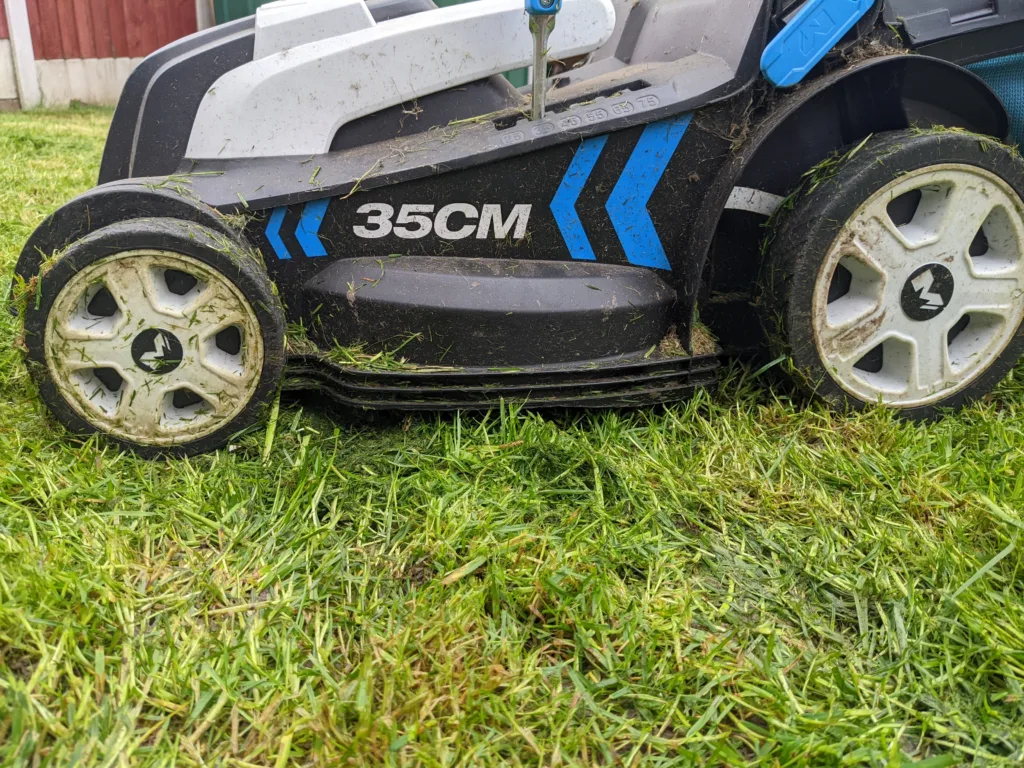
💬 FAQ
Can an electric mower get rained on?
No, an electric lawnmower can’t get rained on. Your mower should be fine if it’s out in the drizzle for a couple of minutes, but using the mower in the rain is just as dangerous as mowing wet grass. There’s a small but very real risk of electrocution if you operate an electric lawnmower while it’s raining. You also shouldn’t leave the mower out in the rain even when it’s not in use because the water could damage the mower’s electric components.
Can I cut wet grass with a Flymo?
Generally speaking, you can technically cut wet grass with most Flymo mowers, however, the manufacturer recommends that you “avoid operating your lawnmower in wet grass” whenever possible. All of Flymo’s lawn mowers are either corded or cordless electric, so you risk getting shocked by mowing grass that’s wet. Flymo’s robot mowers are suitable for cutting grass in all conditions, so they’re worth considering if you want a lawn that’s neatly trimmed regardless of the weather.
Can you use an electric mower to mow dewy grass?
No, you shouldn’t use an electric lawnmower on your lawn if the grass is wet with morning dew. If there’s a sunny day ahead, wait to mow your lawn in the late afternoon, when all the dew has evaporated throughout the day and there’s a reduced risk of electric shock.
